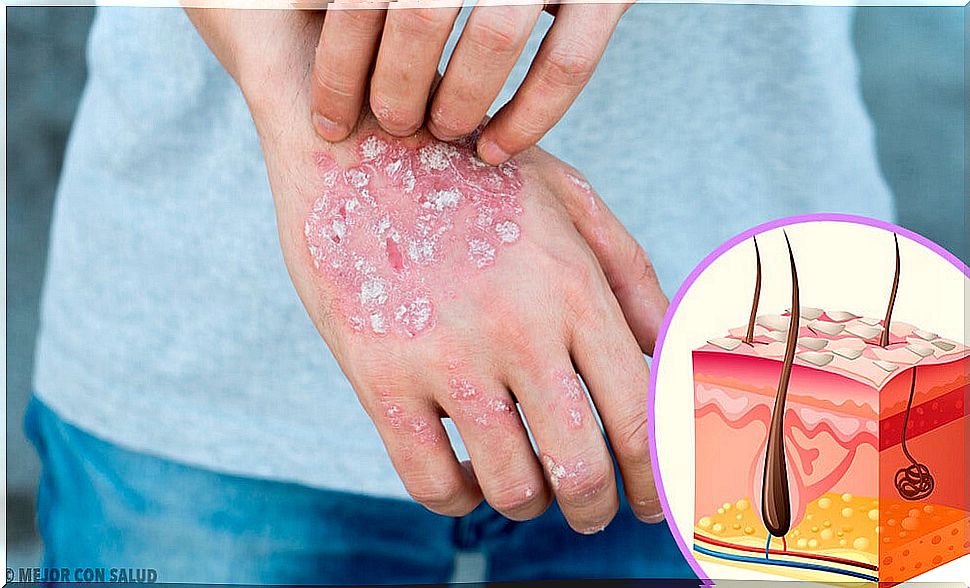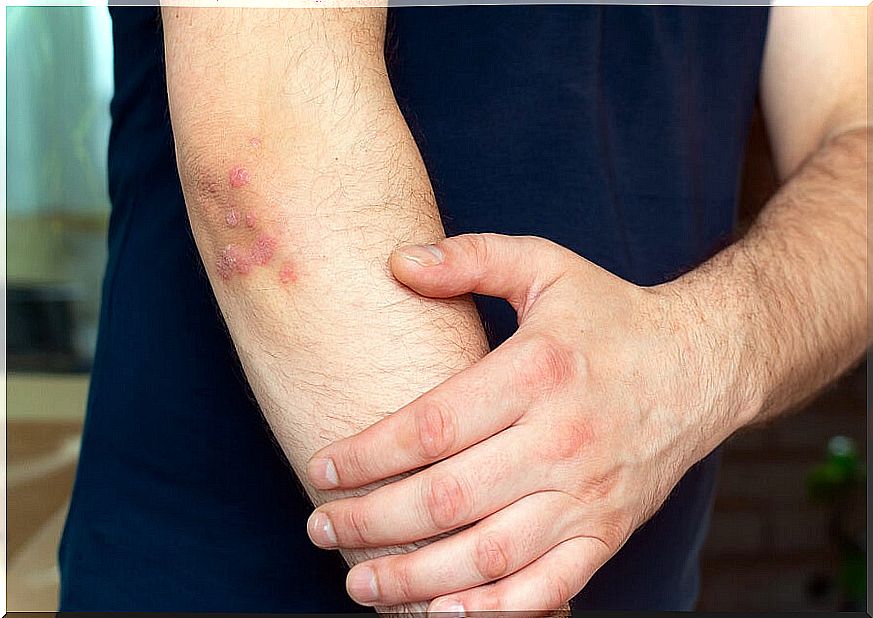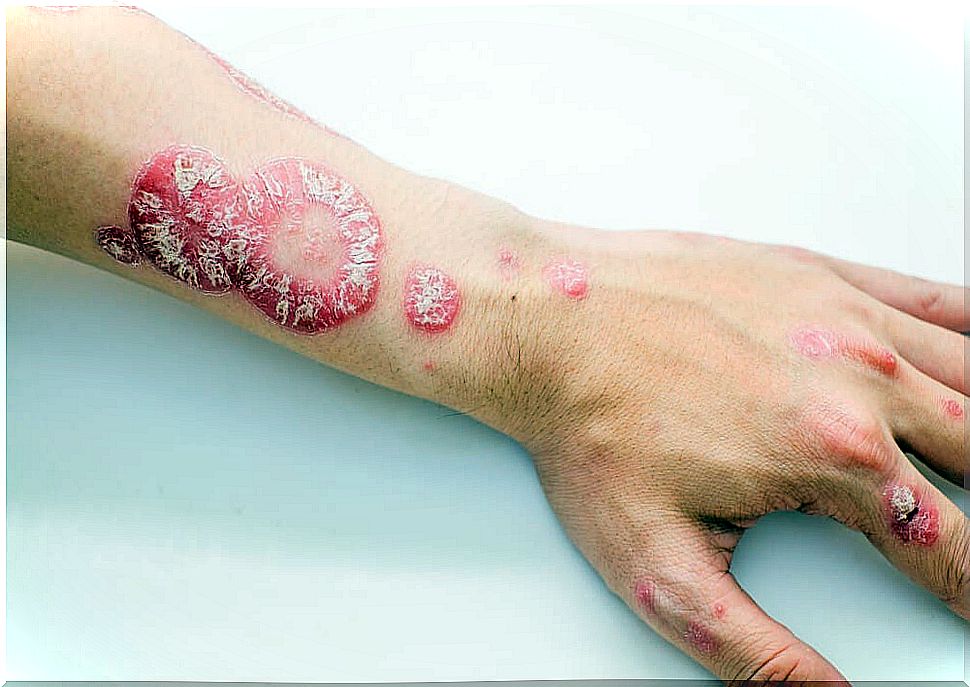Psoriasis: Causes, Symptoms, Diagnosis And Treatment
Psoriasis is a fairly common skin condition that can dramatically reduce a person’s quality of life.

Does your skin feel itchy? Do you have painful patches where it is red? It may be psoriasis, an increasingly common disorder characterized by redness and scaling of the skin.
In the presence of discomfort, the most advisable thing is to request an appointment with the dermatologist so that he analyzes the situation and makes a timely diagnosis, after which he will establish the treatment to follow. Next, we will briefly tell you everything you need to know about psoriasis.
What is psoriasis?

According to an article written by Shinjita Das, MD, Harvard Medical School and published in the MSD Manual, psoriasis is an inflammatory skin disease characterized by the presence of erythematous papules and plaques. Among its main symptoms are:
- Peeling.
- Redness
- Itching
- Swelling.
- And even, in the most serious cases, pain.
The World Health Organization has estimated that more than 100 million people in the world suffer from this annoying disease. This figure, in addition, would increase due to factors such as stress, environmental pollution, chemicals that surround us and even some medications.
This pathology, mainly, would affect people between the ages of 15 and 35, although it can also appear in children and the elderly.
Causes of the disease

The specialists of the Austral University Hospital of Argentina point out that although the origin of this disorder is not known for sure, it is estimated that it could have a genetic and hereditary component. More studies would be necessary.
In fact, if both parents suffered from psoriasis, there would be the possibility that one in four children would inherit this disease. Although, of course, medicine is not an exact science. On the other hand, there are other factors that would influence its appearance:
- Medications: the consumption of some medications could contribute to the appearance or proliferation of psoriatic outbreaks. Therefore, it is important that the doctor is aware of any medications that are taken on a regular basis.
- Stress: any situation that produces stress could trigger this skin pathology.
- Climatology: According to an article in Occupational and environmental medicine , frequent changes in heat and cold could cause this condition. Also, sunburn could cause flare-ups of this disease.
- Trauma: any type of blow could be the trigger for its appearance in the affected area.
Common symptoms
The main symptom of this disorder is the appearance of reddish spots on the skin that usually lead to peeling of the affected area and itching. The itching can even be painful for some patients.
The most common area where psoriasis symptoms appear is on the back, scalp, and extremities. However, there are also cases where it proliferates in the genitals, armpits or even under the nails.
This pathology can manifest itself very differently in each individual, so its classification is based on the severity of the injury, on the shape and pattern of the scales. The medical consultation is, therefore, unavoidable.
How is it diagnosed?

In general, this diagnosis is usually made by a dermatologist, who will proceed to evaluate the lesions and prescribe a treatment according to the personal needs of each patient.
- In its initial stage, this disease can go unnoticed, be confused with an allergic reaction or with dandruff if it is on the scalp.
- In some cases, a skin biopsy is usually performed to perform a microscopic analysis of the sample and thus rule out other possible pathologies.
Psoriasis can present with different levels of severity, which will depend on the affected area, the response to treatment and the impact on the patient’s life.
Treatment of psoriasis
There is no single rule on the best treatment to use. In fact, the Spanish Association of Pediatrics explains that there are three types of treatment against this condition:
- Phototherapy: consists of controlled exposure to ultraviolet light. In this way, it is possible to reduce inflammation and stop the excessive production of skin cells that form psoriasis. It is a very effective treatment, although quite long, since it requires a minimum of 20 sessions.
- Drugs: administered orally and fight psoriasis outbreaks from within the body.
- Topical substances: the vast majority of cases are initially treated with creams, lotions and shampoos, which are applied directly to the skin.
Tips for dealing with psoriasis

Here are some tips to prevent and treat psoriasis in a simple and natural way. However, the dermatological consultation is widely recommended.
- Sunbathe with common sense and protection.
- Avoid toxic habits such as tobacco and, also, alcohol.
- Drink plenty of water throughout the day and outside of main meals.
- Seawater is often beneficial for people with psoriasis.
- Reduce the consumption of dairy products, sugars, fats and, also, refined flours. Food is essential in any natural treatment.
- Hydrate your skin with natural creams. Aloe vera has calming and regenerating effects.
Visit your dermatologist before the appearance of redness
Remember that any symptoms related to this disorder should see a doctor. The dermatologist will be in charge of suggesting a treatment that, of course, you must follow to the letter.
The natural recommendations can be used as an accompaniment to the creams or the pharmacological treatment indicated by the doctor and they never exempt the consultation with the specialist.









